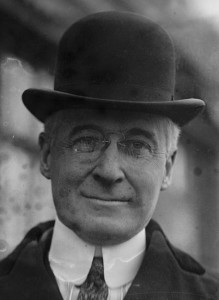Bernard Mannes Baruch (1870-1965) was born in South Carolina to German-Jewish immigrants. His father was a doctor specializing in hydrotherapy and appendectomies, and a key military surgeon in the Civil War. The family moved to New York City, where Baruch first worked as an office boy for $3 a week. After college, he became a stock broker and made a fortune trading sugar (though he would lose and regain his fortune several times). By 30, he was among the most successful financiers of all time, nicknamed “The Lone Wolf of Wall Street” as he worked independently and resisted joining a financial house. In 1916, Baruch left finance and became an adviser to President Woodrow Wilson. He was soon the chairman of the War Industries Board and managed America’s economic mobilization for World War I. At the end of the war, Baruch attended the Paris Peace Conference and was a central supporter of the League of Nations (the precursor of the UN). Baruch continued to advice future presidents, including Roosevelt, whom he helped to create the National Recovery Administration for fair business, industry and labour practices. After World War II, Baruch worked at the UN, particularly to stem nuclear arms proliferation. He would be sought as an adviser until the last days of his life, counselling a total of nine American presidents. He was famous for discussing global issues and politics while sitting on public benches in Central Park (in NYC) and Lafayette Park (in Washington, DC) and was thus called the “Park Bench Statesman”. Baruch was also a noted philanthropist throughout his life, contributing millions to charities and colleges. Click here to learn a few investment tips from Bernard Baruch.
Words of the Week
There are free men with the spirit of a slave, and slaves whose spirit is full of freedom. He who is true to his inner self is a free man, while he whose entire life is merely a stage for what is good and beautiful in the eyes of others, is a slave.
– Rabbi Avraham Itzhak Kook

